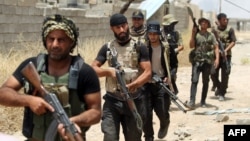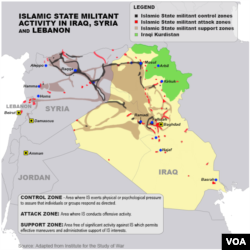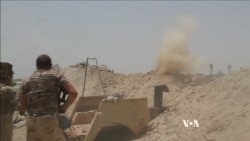The top U.S. military officer said Tuesday the overall U.S. strategy in fighting the Islamic State group in Iraq is not in question, but added President Barack Obama is considering further action, including expanding training sites for Iraqi forces.
General Martin Dempsey, chairman of the Joint Chiefs of Staff, told a small group of reporters during a trip to Israel that it was still "to be determined" whether more U.S. forces might be needed in such a scenario.
The comments come a day after Obama said during a news conference at the Group of Seven (G-7) meeting in Germany the U.S. lacks a “complete strategy” for training Iraqi security forces.
Pentagon spokesman Colonel Steve Warren agreed with Dempsey's assessment Tuesday, saying, “There is a strategy for ISIL (Islamic State group), which I think has been well-articulated.”
But in responding to questions about the United States' ability to train Iraqis, Warren said the problem is getting more forces to train, "the Iraqis need to solve this problem. … We'd like to see more Sunni tribes.
He said the Pentagon is “working through a strategy” for how to train more Iraqi forces and will present that plan to Obama when it is ready.
The U.S. has “seen great success” with U.S.-coalition trained Iraqi forces, Warren added. “Iraqi security forces that we’ve trained tend to perform well … (they) exercise better command and control … exercise better discipline."
Criticism
Obama's comments to reporters in Germany, however, brought a round of criticism from many Republican leaders.
Republican Senator John McCain, chairman of the Armed Services committee, said Monday, "Nearly a year after the president said, 'We don't have a strategy yet to fight ISIS (Islamic State) in Iraq and Syria, he said again, We don't yet have a complete strategy about how to combat ISIS.
“I'd like to see the incomplete strategy. ... I would not like to see ... 75 percent (of) combat missions flown in Syria return to base without firing a weapon, because we don't have forward air controllers on the ground," he added.
“When is this administration going to figure out that if you want to destroy the enemy, you’ve got to be able to identify the enemy and that requires air controllers on the ground, and that means U.S. troops?” McCain said from the Senate floor.
Obama has so far ruled out that as a possibility.
Republican National Committee spokesman Michael Short also criticized the president’s comments Monday.
“When President Obama said 10 months ago he didn’t have a strategy to combat ISIS, it was deeply troubling, and the fact he still doesn’t have a final plan for the deteriorating situation in Iraq is unacceptable,” Short said.
Republican House Speaker John Boehner said on Twitter: "Have repeatedly called upon Pres Obama to develop a strategy to defeat #ISIL. Now he admits he still doesn't have one."
'Not the overall strategy'
When questioned at a State Department briefing Monday, spokesman Jeff Ratheky said Obama was speaking about “how to accelerate and optimize the training and equipping of Iraqi forces, including the integration of Sunni fighters and not the overall strategy to fight” the Islamic State group.
At the G-7 meeting Monday, Obama and Iraq Prime Minister Haider al-Abadi met in the latest high-level effort to strategize against the militant group that swept through large areas of Iraq a year ago and has persisted in some of its biggest cities despite a U.S.-led campaign of airstrikes backing Iraqi ground forces.
The group has also taken control of areas in Syria.
Obama stressed the need to more quickly train Iraqi troops in order to succeed in fighting against Islamic State fighters, saying Abadi agreed on the desire for more security forces who are "trained, fresh, well-equipped and focused."
Obama said the Pentagon is working on plans to boost the training effort, and that those who have been trained are operating "effectively." But he said recruiting, particularly from Sunni tribes, needs to be a priority.
"One of the things that we're still seeing is, in Iraq, places where we've got more training capacity than we have recruits," he said.
Up to five years
Earlier Tuesday, State Department spokesman John Kirby said it could take at least three to five years for Iraq to overcome the Islamic State group's onslaught.
Even then, the war effort “has to be owned by the Iraqis," the retired Navy admiral said.
Kirby appeared Tuesday on an MSNBC morning talk show to try to clarify Obama's comments.
Kirby said Obama was "referring yesterday to a specific plan to improve the training and equipping of Iraqi security forces, and the Pentagon is working on that plan right now. But absolutely, we have a strategy."
Asked if the current strategy is working, Kirby conceded "maybe the way we're going about that needs to be changed a little bit."
He said the U.S. and its allies could go "all in," but he said if the problem is viewed only in a military context, "it's still going to take three to five years. It's not going to happen overnight."
Foreign fighters
In Germany Monday, Obama also reiterated the need to stop the flow of foreign fighters, saying thousands of militants are still going into Syria and on to Iraq.
"Not all of that is preventable, but a lot of it is preventable if we've got better cooperation, better coordination, better intelligence, if we are monitoring what's happening at the Turkish-Syria border more effectively," Obama said.
"This is an area where we've been seeking deeper cooperation with Turkish authorities who recognize it's a problem, but haven't fully ramped up the capacity they need," he added.
Abadi agreed on the need to keep more militants from joining the fight.
Warren, of the Pentagon, told reporters Tuesday the U.S. is looking for ways to work with Turkey to seal off the border region to stem the flow of foreign fighters, including "putting direct pressure on those border crossings from the air" and friendly forces on the ground.
Humanitarian crisis
Medecins Sans Frontieres (MSF) also said Tuesday Iraq faces its biggest humanitarian emergency in a generation as nearly 3 million people have fled the war-torn central and northern areas of the country, in particular the governorates of Anbar, Nineveh, Salah al-Din, Kirkuk and Diyala.
The group said they were driven from their homes by intense fighting, but help is not reaching those still stranded in no-go zones for aid agencies, Reuters reported.
Successive waves of people forced from their homes over the past year are now stranded in "grey zones" with no access to the most basic humanitarian assistance, MSF said.
Many in the grey zones north of the city of Mosul and between Baghdad and Anbar are living in damaged buildings without sanitation, clean water, or basic healthcare, and some have been displaced several times, MSF told Reuters.
"Despite the magnitude of people's needs, the humanitarian response has been mostly concentrated in safer areas, such as the Kurdistan region of Iraq," said Fabio Forgione, MSF's head of mission in Iraq.
U.S. and allied forces conducted 14 airstrikes in Iraq and nine in Syria against Islamic State militants during a 24-hour period ending on Tuesday morning, the U.S. military said.
The strikes in Iraq hit near Mosul, Tal Afar, Baiji, Kirkuk and Makhmur, destroying buildings, fighting positions, vehicles and a rocket system belonging to the militant group, the Combined Joint Task Force said in a statement.
Jeff Seldin contributed to this report from the Pentagon. Some material for this report came from AP and Reuters.
WATCH: Related video report by Sharon Behn









